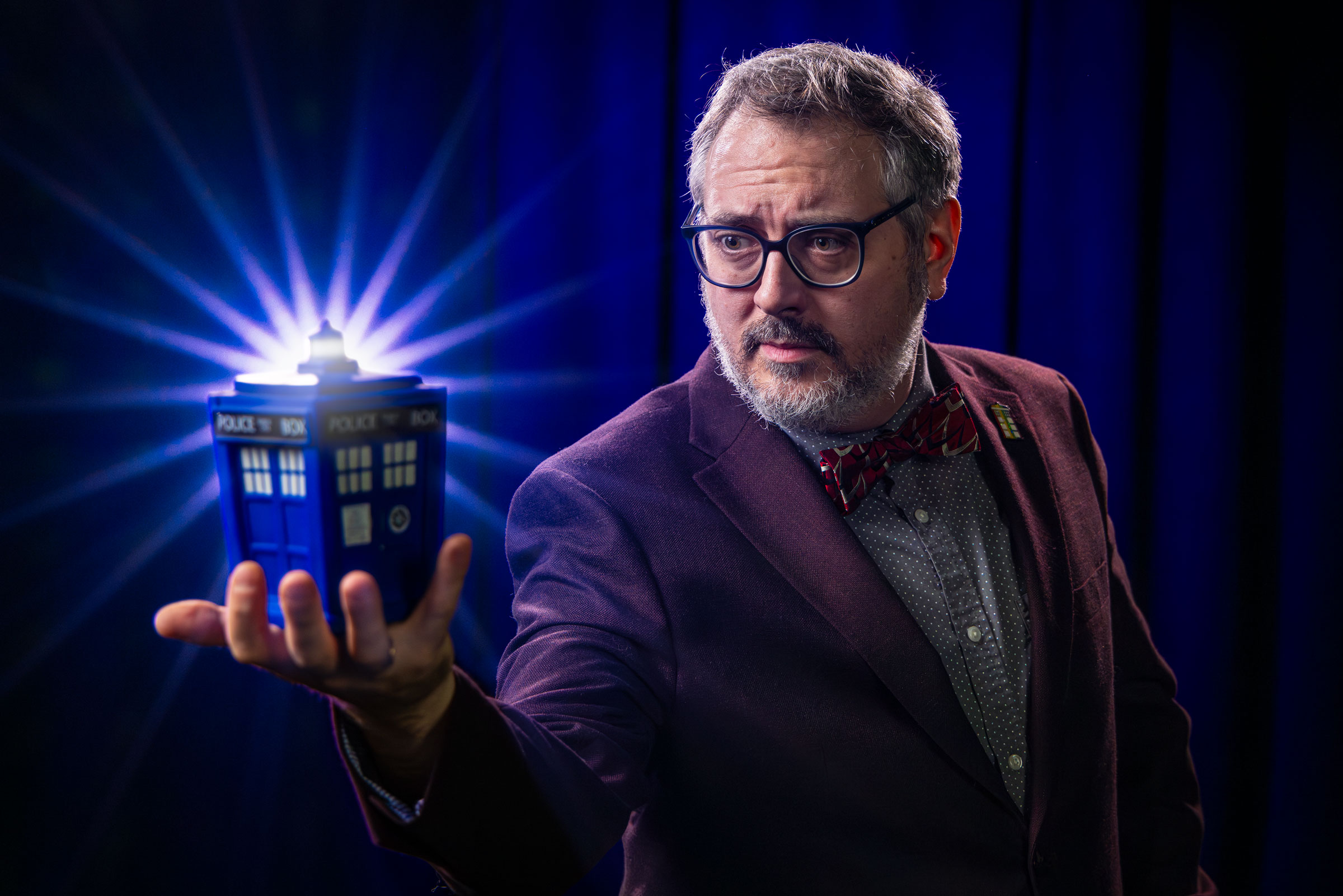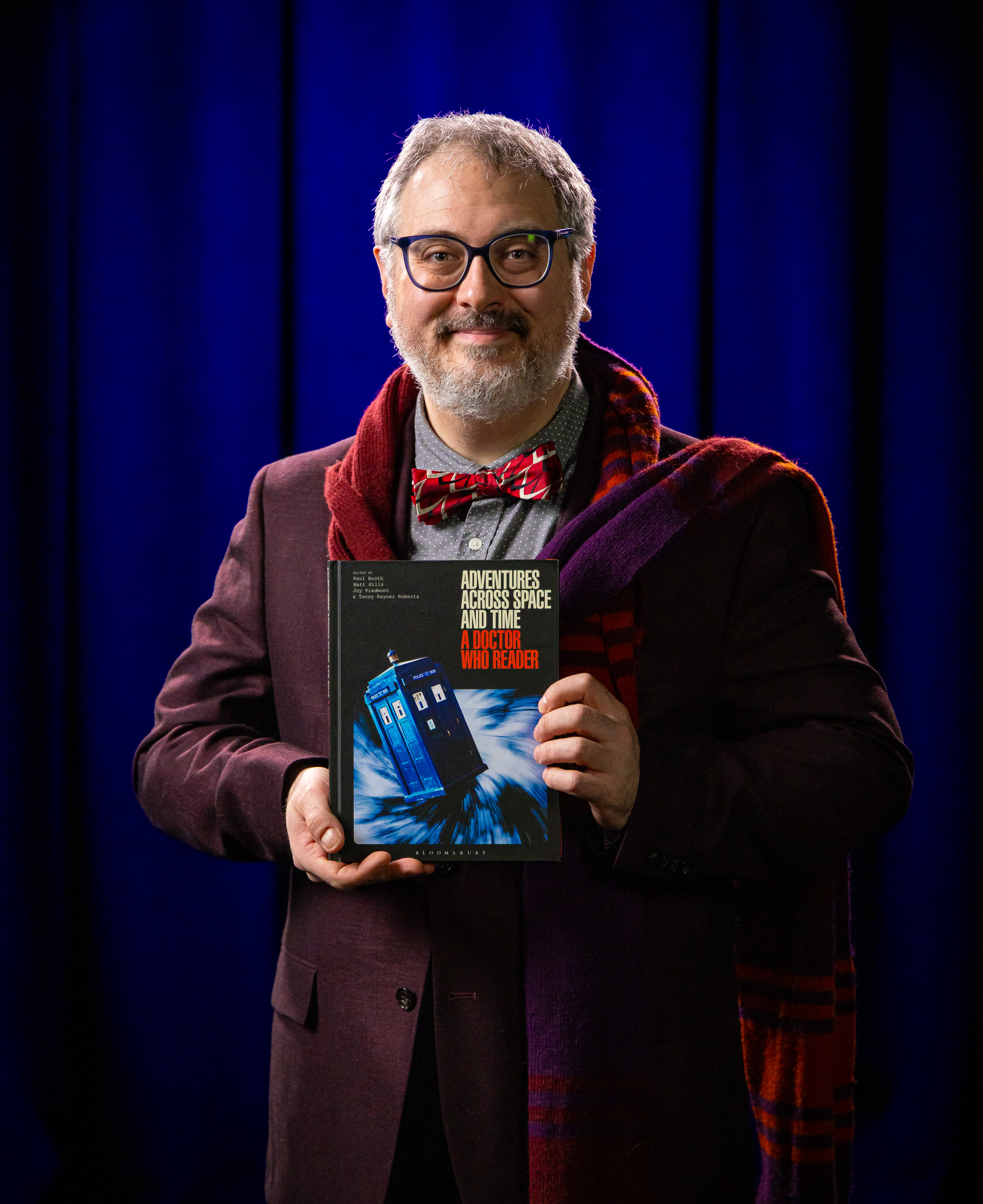 (Photo by Jeff Carrion/DePaul University)
(Photo by Jeff Carrion/DePaul University)
As the popular science fiction series “Doctor Who” reaches its 60th anniversary and new specials begin streaming on Disney+, fans and critics are examining the impact of the long running pop culture staple. One such fan is
Paul Booth, professor of media and pop culture in DePaul University’s College of Communication. As the organizer of the annual
DePaul Pop Culture Conference, Booth is one of the central scholars of “Doctor Who” fandom and its influence on pop culture.
Booth’s recently released anthology, “Adventures Across Space and Time: A Doctor Who Reader,” gives insight into the series’ cultural impact on pop culture and its fan community. In this Q&A, Booth discusses the anniversary and anthology, which includes writings from scholars, fans, writers and the Doctor himself.
Why do you think “Doctor Who” has resonated with audiences for so long?
I think there are a few reasons. First, “Doctor Who” is constantly surprising and new, which is amazing after 60 years. Even the most basic things that are part of the show's DNA — the time travel machine, the alien protagonist, the numerous villains and bad guys — all continue to change and develop over time. We learn new things. It feels like an entire universe is being slowly peeled back with every episode. I also think the show straddles so many different genres, including science fiction, of course, but also horror, comedy, romance, fantasy. There's something for everyone. Finally, there's a certain level of nostalgia. It's cheesy and silly, and it's serious and magnificent, all at the same time.
What do you find most interesting about “Doctor Who” from a pop culture academic perspective? Paul Booth and his book that features writings from people in all areas of the Doctor Who community (Photo by Jeff Carrion/DePaul University)
Paul Booth and his book that features writings from people in all areas of the Doctor Who community (Photo by Jeff Carrion/DePaul University)
Because the show has been around for so long (it started in November 1963), it has really charted cultural changes over time. So, topics that the show was focusing on in the 1970s and 1980s matched a lot of what was happening in the world then.
I'm a cultural studies scholar, and I look at the way audiences approach media as a way of understanding the world around them. “Doctor Who” gives me an entire 60 years of material to examine, and it's still going! I also really enjoy studying the fandom of “Doctor Who” and how that's changed over the years too — especially how fans today are much more concerned with social issues, such as gender and race, in the show.
What are you most excited about for the 60th anniversary celebratory episodes?
Honestly, I'm just excited that it's back. The thing I love most about “Doctor Who” is how it reinvents itself every time there's a new series, new episode, new character. One of the most amazing things about “Doctor Who” is the way they can change everything — new lead actor, new secondary characters, new showrunner — and still have the same vibe as it has been for 60 years. This time, they're bringing back one of my favorite actors in the role, David Tennant, and one of my favorite showrunners, Russel T. Davies. I'm intrigued about how it will be different from what came before. I'm really excited about the fact that the show is getting so much press and attention. It was lacking that recently. And I'm excited to see my favorite duo — Tennant and Catherine Tate — on screen again.
Everyone has their own favorite Doctor, favorite era, favorite monster. My favorite thing about the show is how different it can be. I want every episode to show me something I haven't seen before; repetition is the enemy of the Doctor. So, bring on the new, weird stuff.
Jade Walker is a student assistant of media relations and communications in University Communications.